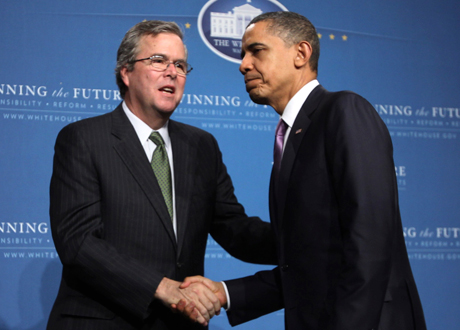
President Obama shakes hands with former Florida Governor Jeb Bush at Miami Central Senior High School on March 4. (REUTERS/Jason Reed)
–The Wall Street Journal reports Wisconsin Democrats may be ready to return to the fold. Other Dems say not o fast. There’s also some talk of Republican defections.
–Labor’s decision to cede everything but collective bargaining early on seems like it was a big political winner; further polling in Wisconsin bears that out. Though all the talk of “compromise” does tend to ignore the fact that duly elected Republicans have the votes to enact something that is only being stymied by procedural jujitsu, Democrats have managed to inject the term into the conversation.
–Talk of recalls is more than just chest puffing.
–Little movement on the federal budget over the weekend as both Republicans and Democrats held their respective lines.
–Congressional demographics help explain polarization, argues John Harwood.
—New York Magazine writes up the backstory of Rep. Peter King’s hearings on “radicalism” among American Muslims starting this week. A taste:
“Pete King has to understand that this is not just a hearing in Washington,” says the congressman’s former friend Faroque Khan. “It will resonate across the Muslim world. And depending on how he does and how it turns out, it could create more problems. I hope he understands that. There’s a perception in some parts of the world that the United States is at war with Muslims. I don’t think it’s true. But this is the man in the street.”
King says such arguments only play into the hands of the enemy. “People think, ‘If we do look into this, it’s going to make the community more hostile,’ ” he says. “But if they’re already hostile, we’re playing their game.”
–A Sunday speech by Deputy National Security Adviser Denis McDonough suggests the White House hopes to quell unease with outreach.
–Roger Lowenstein weighs municipal default. The gist:
But the fantasy of using bankruptcy to suspend government runs up against a hard truth: even in bankruptcy, cities and states don’t disappear — nor do their obligations. Orange County, Calif., which entered bankruptcy in the mid-1990s after its treasurer ran up massive losses in derivatives, ultimately paid every cent it owed. “Among the reasons so few [cities] choose to go this option is, it’s not clear what they gain,” Kurtter of Moody’s says.
–W. James Antle crystallizes conservative discomfort with habitually bestowing the Republican presidential nomination like a service medal. At this point, the greatest question hovering over the field is basically: Who is the not-Romney candidate?
–George Will winnows his 2012 list down to five. Of those, I’d say one borders on unelectable and another strikes me as very, very unlikely to run.
–Caveat du jour in wise words from Walter Shapiro: “The hardest thing to master in presidential politics is to know when to stifle the urge to make dismissive judgments about the chances of presidential contenders.”
–A general law of politics is that governing is a surefire antidote to popularity; whatever policies someone enacts, they’re bound to rankle someone. I think the most interesting aspects of this Quinnipiac “temperature” poll out today is that while, sure, Michelle Obama evinces the warmest feelings in respondents, Chris Christie does surprisingly well for aggressively carrying out a controversial agenda and that Sarah Palin is down in sub-zero range with Harry Reid and Nancy Pelosi. As carefully as she guards her public interactions, Palin has been astonishingly bad at seizing on her out-of-office opportunities.
–A report suggests efficiency lost from poor transportation infrastructure (read: traffic) costs us $200 billion every year.
–Jon Ralston uncovers some shady PAC manipulation by Rory Reid in Nevada.
–If you like morning round-ups, surf on over to Global Spin for your a.m. dose of international reading.
–And I really recommend clicking through TIME’s new list of top 25 “financial” blogs. (I use the scare quotes because the scope really goes far beyond business and, frankly, I’ve read most of these bloggers for years without thinking of them in such narrow terms. Many, if not all, qualify for best blogs period.) The list is not only really good, we got people like Paul Krugman and Stephen Dubner to write about their colleagues.

